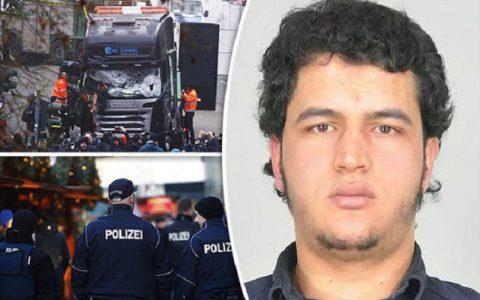
Berlin truck killer visited 15 mosques and contacted ISIS-linked jihadis prior to attack
The twisted jihadi who drove a truck into a Christmas market in Berlin earlier this month visited 15 mosques and contacted two ISIS-linked individuals prior to the deplorable attack.
Anis Amri, who brutally murdered 12 people in the sickening assault last Monday, is believed to have been in contact with fellow extremists while in the western state of North Rhine-Westphalia, according to German media reports.
He had applied for asylum under eight different aliases in western Germany – one of which he used in Oberhausen.
By February 2016, Amri was mainly located in Berlin – despite the fact he should not have been allowed to leave North Rhine-Westphalia due to asylum restrictions.
The state criminal investigation office in Düsseldorf took another three months to officially classify Amri as a threat – issuing the warning on May 10.
In Berlin, the killer had allegedly frequent contact with people whom German security services claimed had ties to the radical Salafist-Islamist scene. Authorities were already investigating two of Amri’s contacts suspected of planning a terror attack.
But the surveillance information gathered on Amri by state-level security services was not passed to Germany’s federal intelligence unit for another six months – reaching the Federal Office for the Protection of the Constitution on October 13, 2016.
German security services have been widely condemned since the killings for their failure to prevent the attack, despite monitoring Amri for almost a year before it happened.
Despite the fact Amri managed to flee to Italy after committing the sickening atrocities on December 19, Jean-Claude Juncker has begged for the open-borders Schengen Zone to remain open.
The EU Commission president was savaged for his pleas to keep the “outrageous” policy, despite calls for it to be scrapped after a plethora of terror attacks since the beginning of 2015.
He said: “Europe must continue to provide shelter to people fleeing war zones.
“In times when terrorists are not stopped by national borders, a national approach to interior policy is no longer enough Our values, the way in which we live together in freedom and with a spirit of openness, are our best means to fight against terrorism.”
Source: /Express





